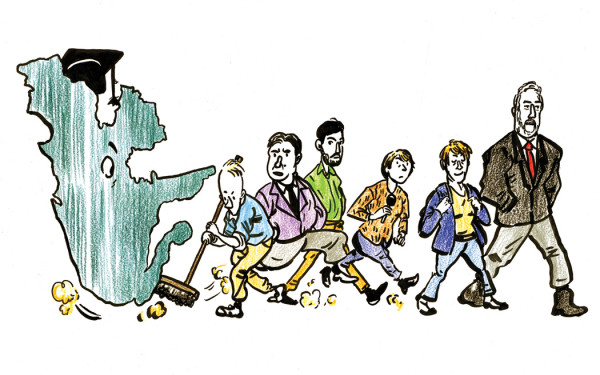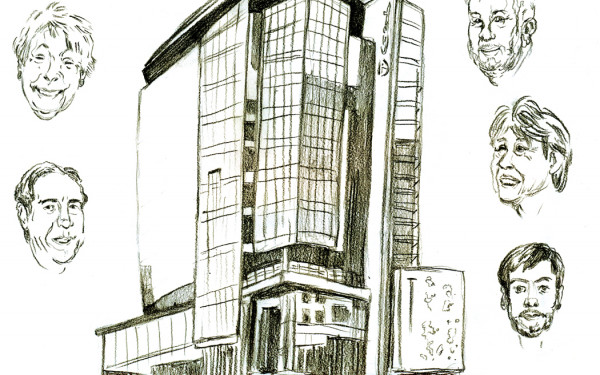Concordia Student to Lead Quebec Green Party
Alex Tyrrell on Breathing New Life into the Party Ahead of a Possible December Provincial Election
Concordia student Alex Tyrrell is the province’s newest party leader after being elected head of the Green Party of Quebec on Sept. 21.
Tyrrell, who is currently pursuing a degree in environmental science, is also by far the youngest party leader in Quebec at age 25.
In an interview with The Link, Tyrrell suggested that his election as leader of the Greens is part of a shift towards “a youth-based party” that will allow activists like him to influence debate in the province.
“We need to be a little more outspoken on some of the issues,” Tyrrell told The Link. “I think now that we have a younger leadership figure, we’ll really be able to go in and influence the debate by being outspoken.”
Originally from the western Montreal suburb of Beaconsfield, Tyrrell studied mechanical engineering technology at Dawson College. “I went there because I wanted to work on implementing green technology,” he said.
However, Tyrrell soon observed that “we aren’t actually living in a province or in a country that takes the environment seriously.”
“There’s no green revolution happening right now,” he said.
At Concordia, Tyrrell explained, “I realized that really the main obstacle to progress on the environment is not technological or scientific but it’s a lack of political will.”
Tyrrell says he was always interested in politics, but that it was his frustration with this obstacle that led him to get more seriously involved.
“I think that a lot of the problems in politics are due to the fact that good people don’t really like to get involved,” he said. “The political positions are sort of left to the last person standing a lot of the time.”
A supporter of the federal New Democratic Party under Jack Layton, Tyrrell gave up on the NDP after Thomas Mulcair became leader. He was then drawn to the Green Party of Quebec, not only because of its position on environmental issues, but also because of its support for free education during the 2012 student strike.
In the 2012 provincial election, Tyrrell ran for a seat in the National Assembly as the Green candidate in the West Island riding of Jacques-Cartier. He finished in third place with 4.5 per cent of the vote.
The Greens ran 66 candidates across the province in that election and came in sixth, with one per cent of the popular vote.
Since the party’s founding in 1985, it has never won a seat in the National Assembly nor ended up with more than four per cent of the vote.
Tyrrell said he was critical of the former leadership of the party. “I think that in the last election the Green Party hit the bottom because of a number of problems with communications and a certain lack of leadership in the party,” he said.
“There are a lot of really intelligent, honest and motivated people willing to work that just really weren’t put into the right roles last time and it was more an organization failure than a failure of policy.”
Tyrrell also addressed how his party’s policy is different from that of left-wing provincial party Québec solidaire, who have electorally leapfrogged the Greens.
“Québec solidaire is a more ideological party,” he said. “And the Green Party is more pragmatic.”
He added that the Greens are “also the only party where we have people who are openly sovereignist and openly federalist working together on the same team towards a united Quebec.”
In addition, Tyrrell continued, “The Green Party will always prioritize the environment. Of course we’re very strong on social issues as well, but for us the number one thing is the environment.”
One of the social issues that Tyrrell brought up was free education. Another was the public healthcare system, which he defends and hopes to see extended to cover dental care and prescription medication.
During the course of his leadership campaign, Tyrrell also advocated in favour of an expanded, free public transit system. He told The Link that this would be “the best way to increase the ridership and decrease the number of cars on the road, without imposing some kind of a car tax, for example.”
“That would kind of be unfair for the workers who need to get to work, and not everybody has the option of public transit yet,” he said.
The funding for these projects would come from “a number of different economic policies,” according to Tyrrell, such as increasing the number of tax brackets, imposing a carbon tax on big polluters and demanding higher royalties in the mining sector.
Tyrrell conceded that some companies might prefer to do business elsewhere as a result of such policies. However, he advised against “giving away our resources.”
“I don’t think it’s necessary for us to sacrifice our environment and our resources for the short-term economic gains of private companies,” he said.
Regarding the Parti Québécois government’s proposed Charter of Quebec Values, Tyrrell said the Greens are against it. He called it “an unfortunate tactic that [the PQ has] chosen to use.”
He suggested that the charter is a distraction from important environmental issues such as hydraulic fracturing on Anticosti Island and oil drilling in the Gulf of the Saint Lawrence.
The charter will most likely not be passed into law, said Tyrrell. “But the fact that the Parti Québécois wants to actually try to go to an election based on these divisions across ethnic and religious lines I think is ridiculous, and it shows us the state of politics in Quebec at this point,” he said.
Tyrrell told The Link that he does anticipate a provincial election in December.
“[The Green Party is] in pre-election mode right now, so we’re operating under the assumption that there will be an election called about three days after the municipal election,” he said. “If there’s an election, we’ll be ready.”
Tyrrell went on to say that he and the Green Party have a lot of work ahead of them, such as finding candidates and updating their platform. Nevertheless, Tyrrell said, “People will be surprised at what we’re able to accomplish.”
What the Greens hope to accomplish is not necessarily winning the next election, but being part of the debate and challenging the prevailing discourse in the province, he added.
“For me, that’s the big goal: [it] is to be able to influence the political conversation,” he said.
But Tyrrell also brought up the possibility of a Green majority government down the line. “We live in volatile times in Quebec and I think that there’s potential for major change in the future,” he said.

_900_597_90.jpg)


_600_375_90_s_c1.jpg)
1-page3_600_375_90_s_c1.jpg)

